#include <NewSignalDialog.h>
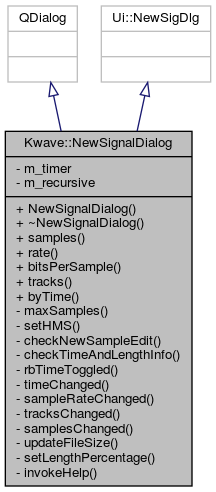
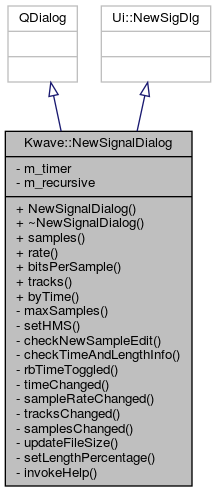
Public Member Functions | |
| NewSignalDialog (QWidget *parent, sample_index_t samples, unsigned int rate, unsigned int bits, unsigned int tracks, bool by_time) | |
| virtual | ~NewSignalDialog () |
| sample_index_t | samples () |
| double | rate () |
| unsigned int | bitsPerSample () |
| unsigned int | tracks () |
| bool | byTime () |
Private Slots | |
| void | checkNewSampleEdit () |
| void | checkTimeAndLengthInfo (int) |
| void | rbTimeToggled (bool) |
| void | timeChanged (int) |
| void | sampleRateChanged (const QString &) |
| void | tracksChanged (int) |
| void | samplesChanged (int) |
| void | updateFileSize () |
| void | setLengthPercentage (int percent) |
| void | invokeHelp () |
Private Member Functions | |
| sample_index_t | maxSamples () |
| void | setHMS (sample_index_t &samples) |
Private Attributes | |
| QTimer | m_timer |
| bool | m_recursive |
Detailed Description
Definition at line 35 of file NewSignalDialog.h.
Constructor & Destructor Documentation
◆ NewSignalDialog()
| Kwave::NewSignalDialog::NewSignalDialog | ( | QWidget * | parent, |
| sample_index_t | samples, | ||
| unsigned int | rate, | ||
| unsigned int | bits, | ||
| unsigned int | tracks, | ||
| bool | by_time | ||
| ) |
Constructor.
- Parameters
-
parent the parent widget the dialog belongs to samples default resolution in bits per sample rate default sample rate bits default resolution tracks default tracks by_time if true: select by time, if false: select by samples
Definition at line 43 of file NewSignalDialog.cpp.
References checkNewSampleEdit(), checkTimeAndLengthInfo(), Kwave::connect(), invokeHelp(), m_timer, rbTimeToggled(), sampleRateChanged(), samplesChanged(), setHMS(), setLengthPercentage(), timeChanged(), Kwave::toInt(), and tracksChanged().

◆ ~NewSignalDialog()
|
inlinevirtual |
Destructor
Definition at line 54 of file NewSignalDialog.h.
References bitsPerSample(), byTime(), checkNewSampleEdit(), checkTimeAndLengthInfo(), invokeHelp(), maxSamples(), rate(), rbTimeToggled(), sampleRateChanged(), samples(), samplesChanged(), setHMS(), setLengthPercentage(), timeChanged(), tracks(), tracksChanged(), and updateFileSize().
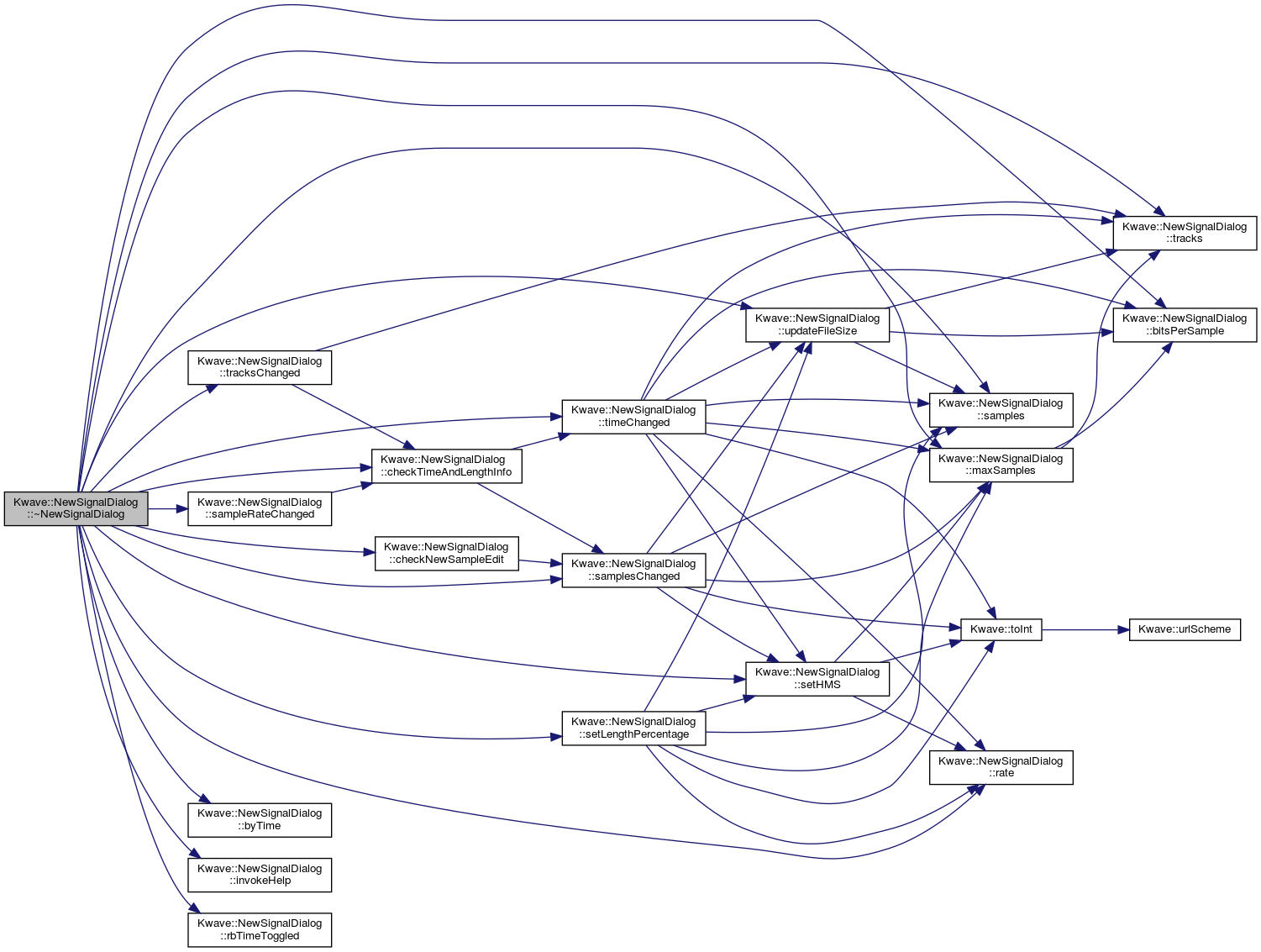
Member Function Documentation
◆ bitsPerSample()
| unsigned int Kwave::NewSignalDialog::bitsPerSample | ( | ) |
Returns the selected resolution [bits per sample]
Definition at line 158 of file NewSignalDialog.cpp.
Referenced by maxSamples(), Kwave::NewSignalPlugin::setup(), timeChanged(), updateFileSize(), and ~NewSignalDialog().

◆ byTime()
| bool Kwave::NewSignalDialog::byTime | ( | ) |
Returns true if the selection was made by time
Definition at line 166 of file NewSignalDialog.cpp.
Referenced by Kwave::NewSignalPlugin::setup(), and ~NewSignalDialog().

◆ checkNewSampleEdit
|
privateslot |
Checks for modifications of the sample number edit. That stupid QSpinBox doesn't notify us about changes :-[
Definition at line 142 of file NewSignalDialog.cpp.
References samplesChanged().
Referenced by NewSignalDialog(), and ~NewSignalDialog().


◆ checkTimeAndLengthInfo
|
privateslot |
Checks for changes in the samples or time info
Definition at line 199 of file NewSignalDialog.cpp.
References samplesChanged(), and timeChanged().
Referenced by NewSignalDialog(), sampleRateChanged(), tracksChanged(), and ~NewSignalDialog().
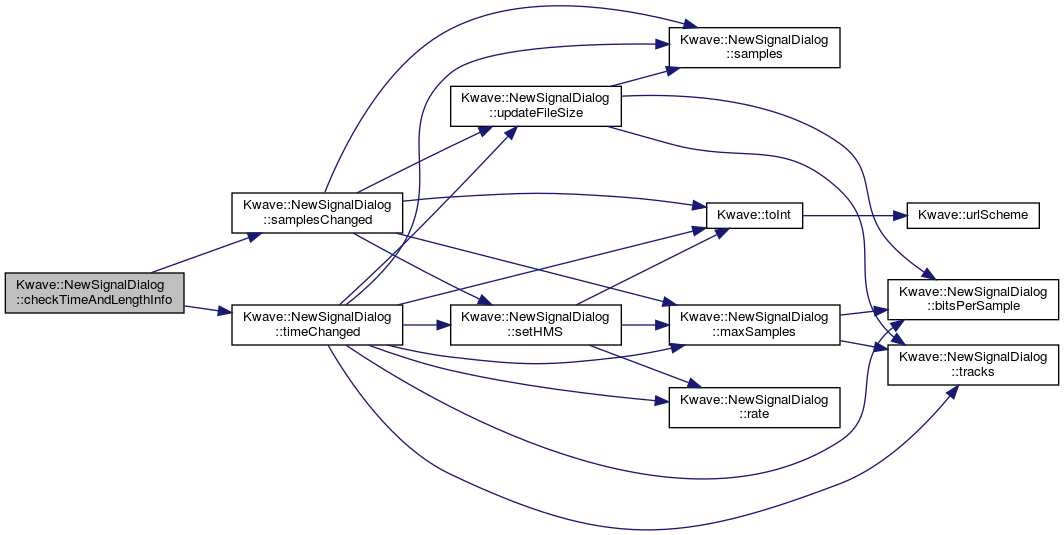

◆ invokeHelp
|
privateslot |
invoke the online help
Definition at line 373 of file NewSignalDialog.cpp.
References _.
Referenced by NewSignalDialog(), and ~NewSignalDialog().

◆ maxSamples()
|
private |
Returns the maximum number of samples per track that can be created with the current settings, based on the maximum file size of a .wav file and the header sizes.
Definition at line 172 of file NewSignalDialog.cpp.
References bitsPerSample(), and tracks().
Referenced by samplesChanged(), setHMS(), setLengthPercentage(), timeChanged(), and ~NewSignalDialog().

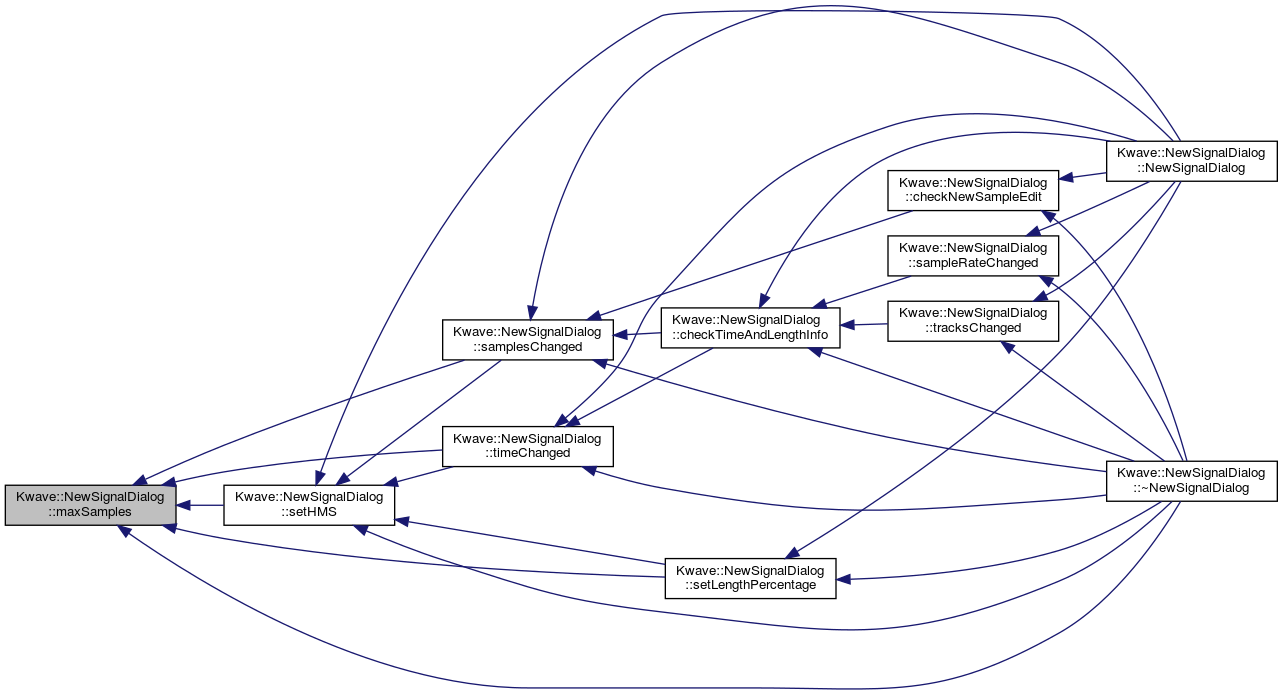
◆ rate()
| double Kwave::NewSignalDialog::rate | ( | ) |
Returns the selected sample rate [samples/second]
Definition at line 133 of file NewSignalDialog.cpp.
Referenced by setHMS(), setLengthPercentage(), Kwave::NewSignalPlugin::setup(), timeChanged(), and ~NewSignalDialog().
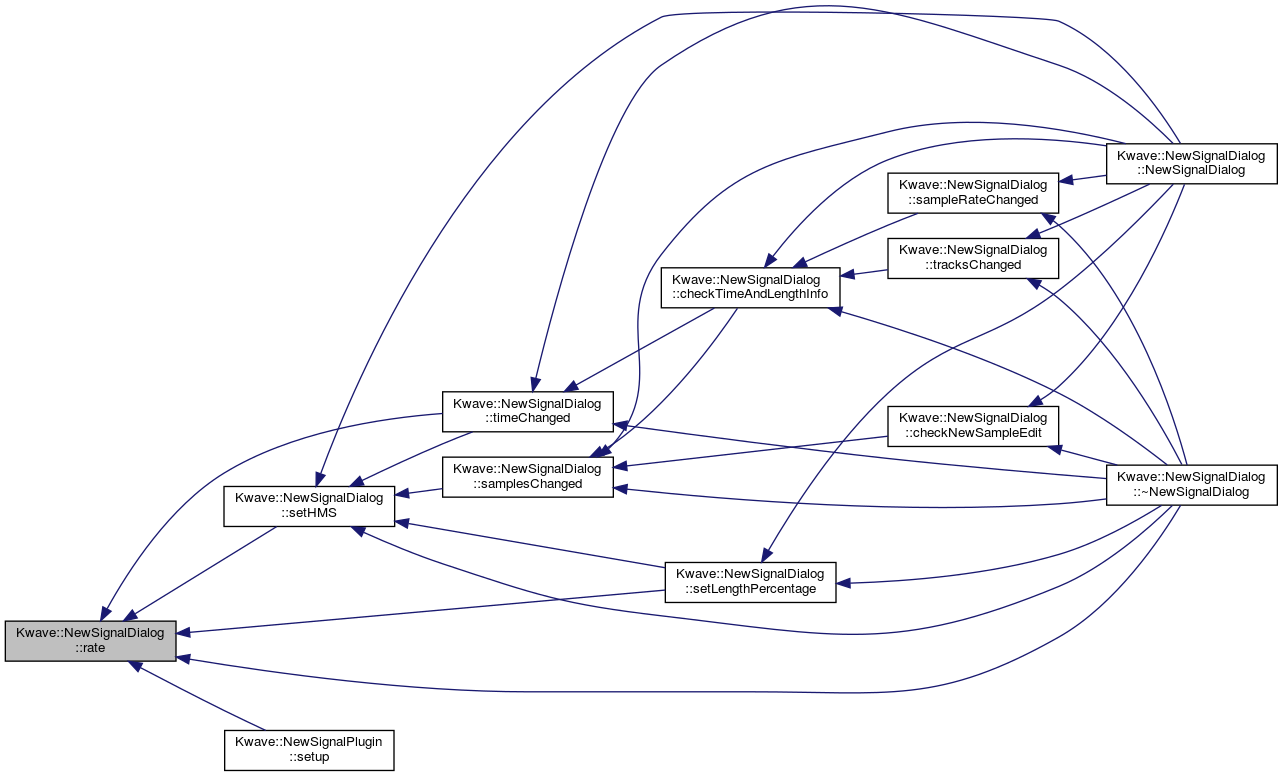
◆ rbTimeToggled
|
privateslot |
starts/stops the sample edit's timer if rbTime has been toggled
Definition at line 187 of file NewSignalDialog.cpp.
References m_timer.
Referenced by NewSignalDialog(), and ~NewSignalDialog().

◆ sampleRateChanged
|
privateslot |
called when the sample rate has been edited or changed
Definition at line 290 of file NewSignalDialog.cpp.
References checkTimeAndLengthInfo().
Referenced by NewSignalDialog(), and ~NewSignalDialog().


◆ samples()
| sample_index_t Kwave::NewSignalDialog::samples | ( | ) |
Returns the number of samples
Definition at line 127 of file NewSignalDialog.cpp.
Referenced by samplesChanged(), setLengthPercentage(), Kwave::NewSignalPlugin::setup(), timeChanged(), updateFileSize(), and ~NewSignalDialog().
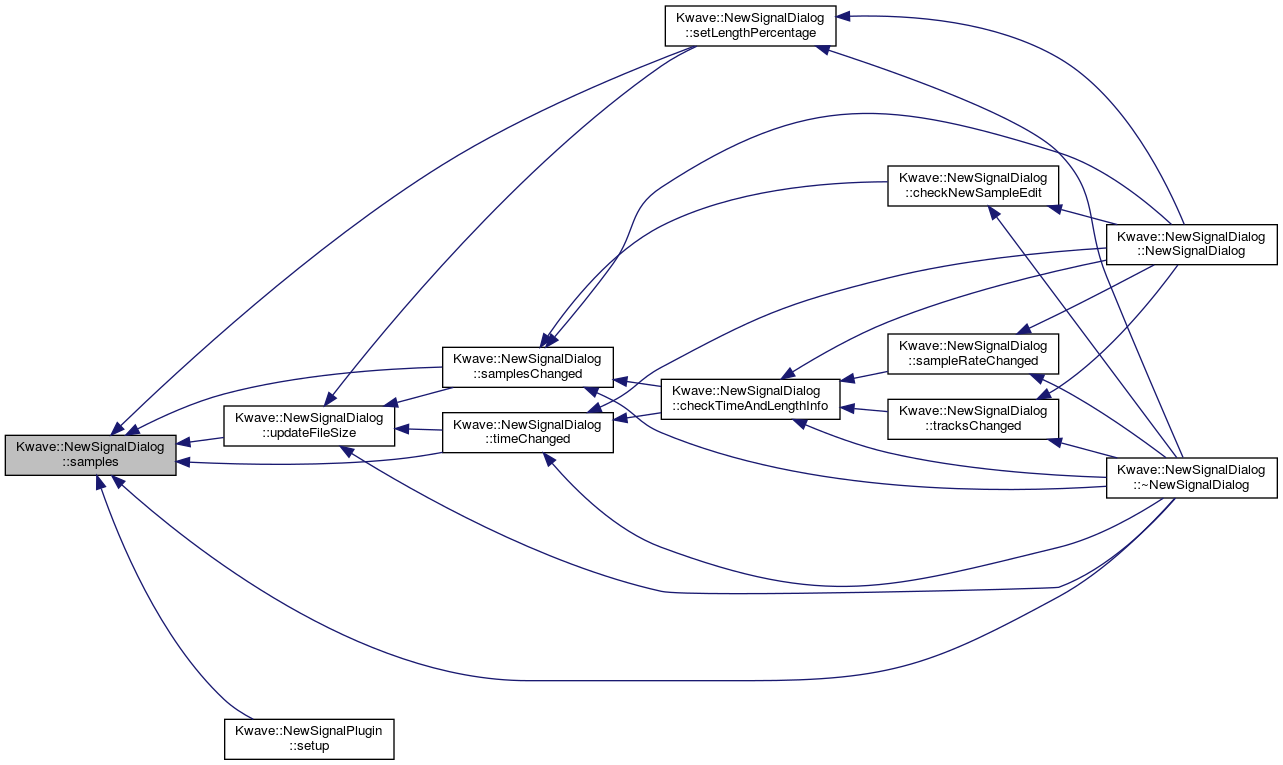
◆ samplesChanged
|
privateslot |
number of samples changed
Definition at line 266 of file NewSignalDialog.cpp.
References m_recursive, maxSamples(), samples(), setHMS(), Kwave::toInt(), and updateFileSize().
Referenced by checkNewSampleEdit(), checkTimeAndLengthInfo(), NewSignalDialog(), and ~NewSignalDialog().
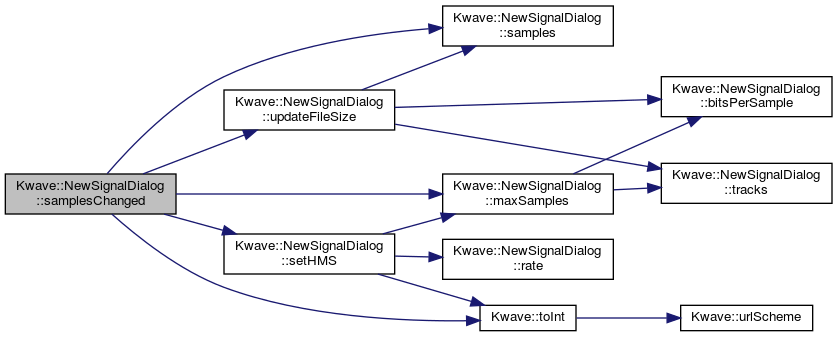

◆ setHMS()
|
private |
Sets hours, minutes and seconds according to a given number of samples.
Definition at line 354 of file NewSignalDialog.cpp.
References maxSamples(), rate(), and Kwave::toInt().
Referenced by NewSignalDialog(), samplesChanged(), setLengthPercentage(), timeChanged(), and ~NewSignalDialog().

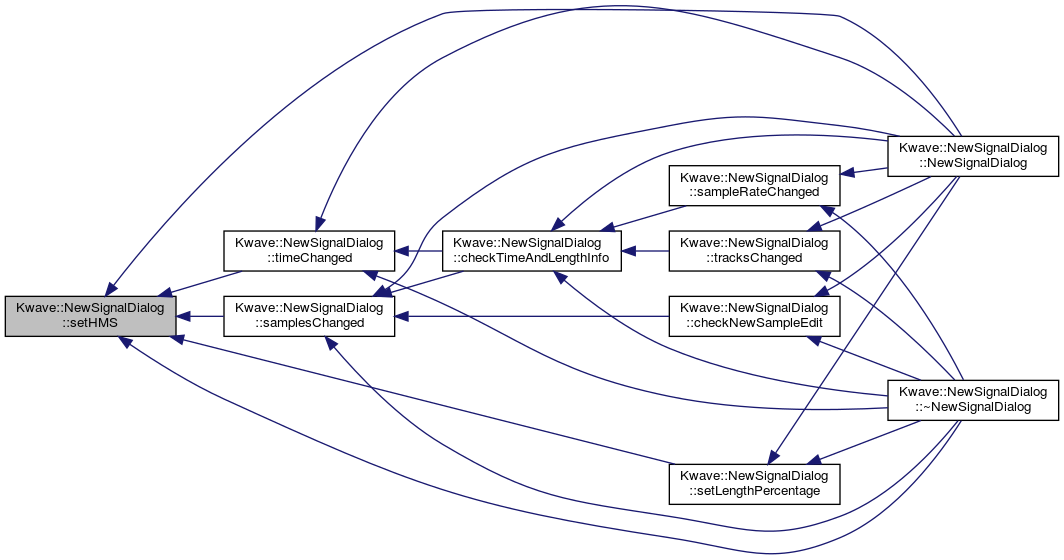
◆ setLengthPercentage
|
privateslot |
called if the slider for the length has been moved
Definition at line 335 of file NewSignalDialog.cpp.
References m_recursive, maxSamples(), rate(), samples(), setHMS(), Kwave::toInt(), and updateFileSize().
Referenced by NewSignalDialog(), and ~NewSignalDialog().
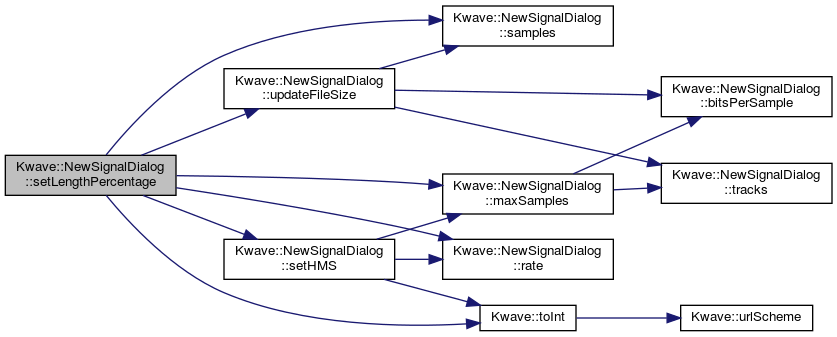

◆ timeChanged
|
privateslot |
updates the number of samples if the time changed
Definition at line 205 of file NewSignalDialog.cpp.
References bitsPerSample(), m_recursive, maxSamples(), rate(), samples(), setHMS(), Kwave::toInt(), tracks(), and updateFileSize().
Referenced by checkTimeAndLengthInfo(), NewSignalDialog(), and ~NewSignalDialog().
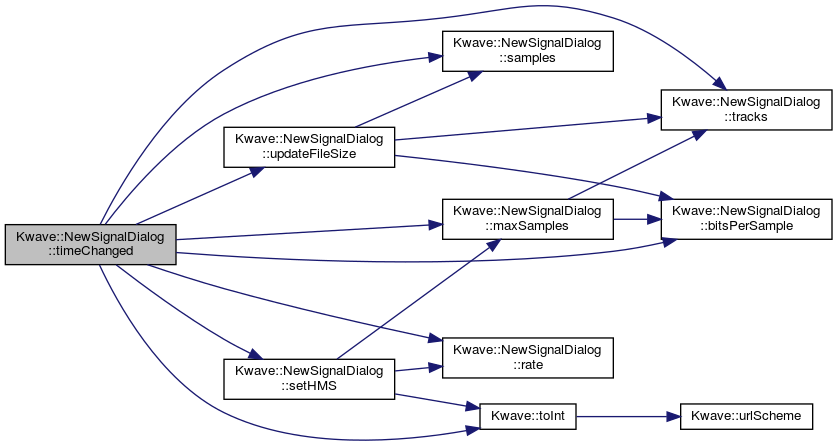

◆ tracks()
| unsigned int Kwave::NewSignalDialog::tracks | ( | ) |
Returns the selected number of tracks
Definition at line 152 of file NewSignalDialog.cpp.
Referenced by maxSamples(), Kwave::NewSignalPlugin::setup(), timeChanged(), tracksChanged(), updateFileSize(), and ~NewSignalDialog().

◆ tracksChanged
|
privateslot |
called when the sample rate has been changed
Definition at line 296 of file NewSignalDialog.cpp.
References _, checkTimeAndLengthInfo(), and tracks().
Referenced by NewSignalDialog(), and ~NewSignalDialog().


◆ updateFileSize
|
privateslot |
updates the file size
Definition at line 316 of file NewSignalDialog.cpp.
References bitsPerSample(), samples(), and tracks().
Referenced by samplesChanged(), setLengthPercentage(), timeChanged(), and ~NewSignalDialog().
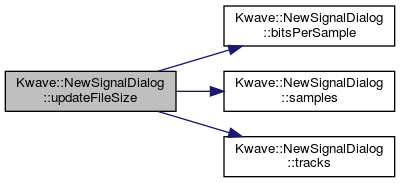
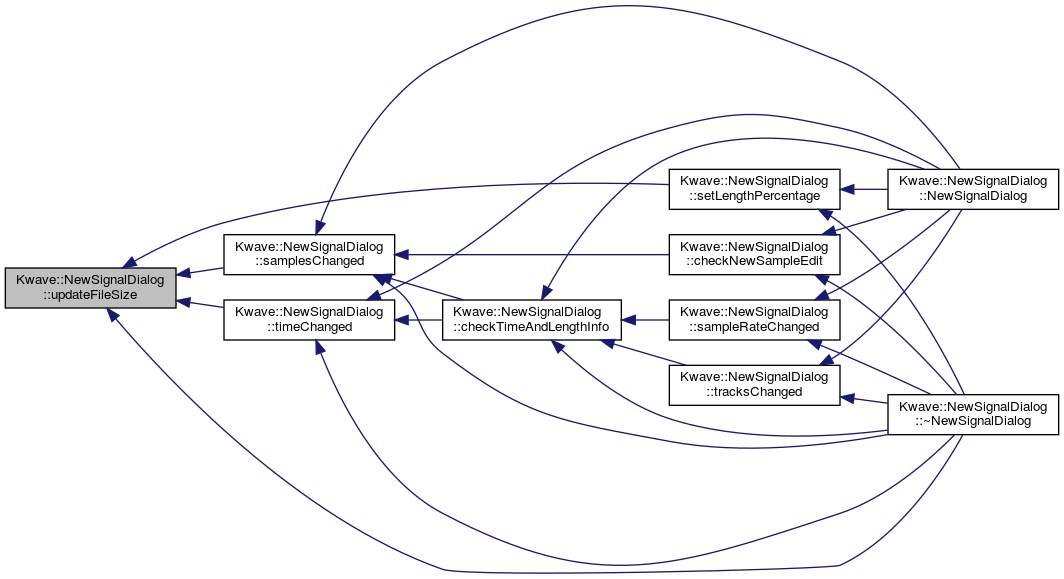
Member Data Documentation
◆ m_recursive
|
private |
flag to avoid recursion
Definition at line 127 of file NewSignalDialog.h.
Referenced by samplesChanged(), setLengthPercentage(), and timeChanged().
◆ m_timer
|
private |
Timer that checks for changes in the sample edit field
Definition at line 124 of file NewSignalDialog.h.
Referenced by NewSignalDialog(), and rbTimeToggled().
The documentation for this class was generated from the following files:
- plugins/newsignal/NewSignalDialog.h
- plugins/newsignal/NewSignalDialog.cpp
